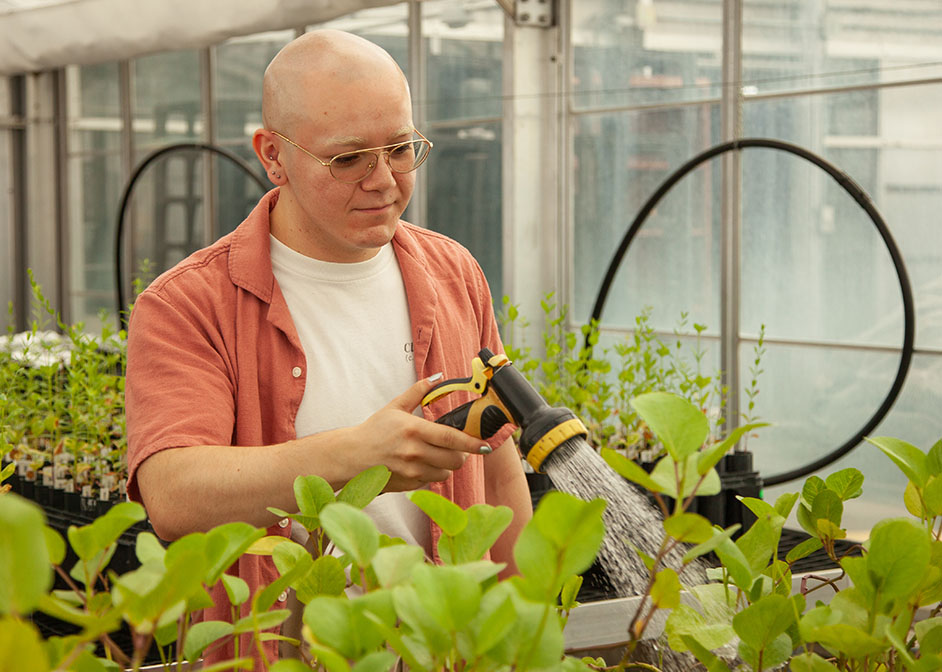Jakob Joachin’s Award on Reserve for Two Years, Immediately Pursues Master’s Degree
“I was hoping to just make it to the honorable mentions," said Jakob Joachin, referring to the moment the news of the 2022 National Science Foundation Graduate Research Fellowships came out. To Joachin’s surprise, there was an email from the NSF; the subject line, in all caps, said CONGRATULATIONS!

Joachin quickly shared the news with family and lab mates and could not sleep the rest of the night.
Joachin, a post-baccalaureate biology student in associate professor of biology and biochemistry Kerri Crawford’s lab, currently has funding from the NSF’s Research Experience for Post-Baccalaureate Students program. That was awarded last August.
“I’m incredibly proud of Jakob,” said Crawford, a faculty member at the University of Houston College of Natural Sciences and Mathematics. “Only a few students receive a Graduate Research Fellowship from the NSF each year. This is a huge accomplishment. Jakob’s hard work and dedication have paid off!”
Joachin will hold the Graduate Research Fellowship funding on reserve for the next two years to use in a doctoral program. In the meantime, Joachin will pursue a master’s degree with Catalina Cuellar-Gempeler, assistant professor of cell and molecular biology at California State Polytechnic University, Humboldt.
“I view my master’s as an opportunity to do something different,” said Joachin. “Also, to build the skills that will help me in the long-run, and of course, once I start my Ph.D.”
The Cuellar-Gempeler lab works with pitcher plants, which are carnivorous plants with fluid-filled “pitchers” that insects fall into and get stuck in the fluid’s digestive enzymes.
“We’ll be studying how bacterial diversity within pitcher plant fluids influences the plant’s ability to degrade its prey,” Joachin said, who is mainly interested in leveraging the benefits of microbes for restoration. The master’s program will give Joachin valuable skills, like analyzing natural and artificial microbial communities and becoming a stronger bioinformatician.
Inspiration from UH Coastal Center
At UH, Joachin spent countless hours on coastal prairies, like the UH Coastal Center, and coastal sand dunes, thanks to involvement with Crawford’s research team, beginning as an undergraduate student.
“I didn’t know research was a possible career path until I started volunteering with the Crawford lab,” Joachin said. "I spent most of my time at the Coastal Center, and I just fell in love with the prairie.”
After conducting research at the center, Joachin learned there is less than 1% of coastal prairie left on the Texas and Louisiana coast from its original expanse. From there, an interest in ecological restoration began.
With the NSF post-bac grant, Joachin studied how water availability influences interactions between soil microbes and plants. Soil microbes are microscopic organisms that can nourish plants or cause disease. The experiment involved three native plant species and three nonnative plant species of the same genus. For example, Joachin used Verbena xutha, native to the area, and Verbena brasiliensis, native to Brazil.
Joachin applied three different watering treatments to the plants to emulate real-world rainfall: drought, flooding and average rainfall. A pathogenic fungus, Fusarium, was also introduced. The purpose of the fungus was to test how it affected plants differently based on their species and whether that effect varies depending on the amount of water.
The findings? Plant genus is a stronger predictor of the plant’s response to the fungus as opposed to whether the plant is native. Additionally, Joachin found the fungus became more antagonistic and genus-specific with flooding conditions.
These findings could help researchers understand the effects of climate change on plants. Joachin is working on a manuscript from this project.
Participation in STEM for Diverse Groups
“Being first-generation, Latinx, and queer-nonbinary, broadening the participation of historically excluded people in STEM is incredibly important and personal,” Joachin said.
With funding from the NSF GRF, Joachin’s research plans have direct applications to restoration, agriculture and biofuels. This could include insights into how people can leverage plant microbiomes to mitigate the long-term effects of land use and increase agricultural yields.
Joachin will not only be able to focus on research with the fellowship, but said, “I will be able to expand my unwavering commitment to science outreach and be the representation I needed as a kid. I’m here. I’m queer. And the road for ecosystem recovery is clear: plant and microbial symbioses.”
- Rebeca Trejo, College of Natural Sciences and Mathematics